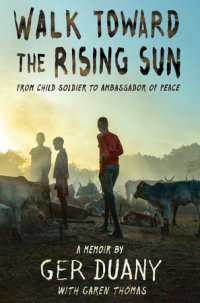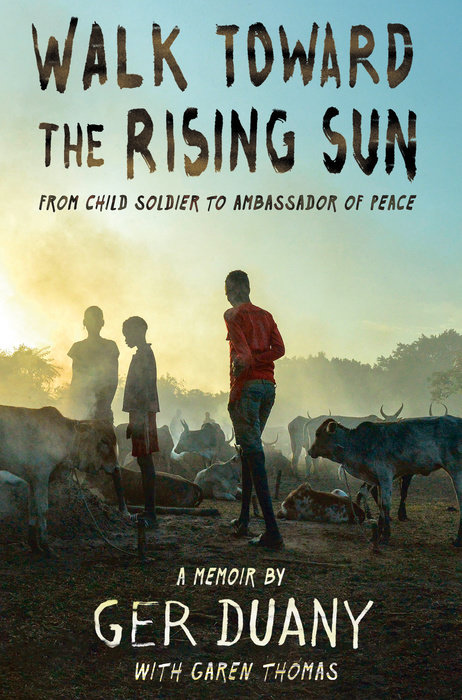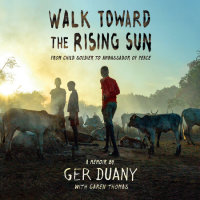Walk Toward the Rising Sun
The amazing autobiography of a young Sudanese boy who went from a child soldier and struggling refugee to international peace activist and Hollywood actor.
Sudan, 1980s: Ger Duany knew what he wanted out of life--make his family proud, play with his brothers and sisters, maybe get an education like his brother Oder suggested, and become a soldier for his people when he's old enough. But then his village was attacked by the North Sudanese military, death kept taking his loved ones away, and being a child soldier was not what he thought it would be. Amid heartbreak, death, and violence, can this lost boy find his way to safety?
America, 1990s: After boarding a flight without his family to seek refuge in a foreign country, Ger worked tirelessly to adjust to a new life. It wasn't long before he was thrown into the spotlight, as people discovered his talents for basketball, modeling, and acting. Yet the spotlight wasn't the only thing following him, as he battled the effects of PTSD, resisted the siren call of the excesses of fame, and endured a new kind of racism in America. Amid fame, trauma, and the memory of home, can this lost boy find himself?
An Excerpt fromWalk Toward the Rising Sun
Belonging
I was about six years old when I sat in the dirt clearing of Liet Village center in 1983 or ’84, amid a few hundred other villagers, frozen in silence, watching my mother’s youngest brother, Tut, lay his full six-foot, six-inch frame down in the dirt. The wind whooshed through the high grass, sorghum, maize, and tobacco on our subsistence farm, which surrounded our mud huts, and cattle lowed in the distance. Tut crossed his arms over his muscular chest and placed his shaved head inside a depression dug into the earth specially to catch the blood. He lay there without a trace of labored breathing or a single tremble while one of our village elders delivered a booming speech about courage, a man’s responsibility to provide for his community, and his right to take wives.
ELDER 1: This young man will be marked into adulthood this morning. God protected him from many battles so that he might receive this honor in front of his elders and peers.
Another elder rose and gestured with long, graceful arms as he spoke.
ELDER 2: Today is a blessing. It is important in our culture to mark every Nuer man, so when the world looks upon him, they will know he is the bravest of all men and will protect his people at all costs. There have been many courageous warriors throughout history, each one a legend: Muon Kem Joak, Ger Pathot, and Buth Diu, who spearheaded the self-determination of southern Sudan. On this day, Tut will join their storied ranks.
A third elder, known for steady hands, pulled a ceremonial knife from its place among the coals of a small fire (where it was first sterilized). The lines on this elder’s face deepened as he wiped the knife with a cloth, leaned over Tut’s face, and frowned in concentration. The shadow of a hawk in flight flashed across the sunny clearing, and the elder cut a line all the way across the blank canvas of Tut’s forehead.
Due to the knife’s sharpness, the blood did not come right away. It was almost as if its edge hadn’t even slid across his brow. Clean, precise, imperceptibly thin, like a paper cut. Then I saw a line, the line turned red, and after another second, the blood began to drip into Tut’s ears. By the time it started gushing from the wound, the elder had already carved a second line below and begun a third, parallel to the first two. He didn’t stop until he had carved six lines across the brow, and by then torrents flowed into Tut’s eyes and all across his cheeks. The blood darkened the already-black earth beneath his crown and brightened Tut’s dark complexion with a crimson sheen.
Of course I knew he was a living, breathing man, but while the cutting took place, Tut could have been obsidian, or the casket of a pharaoh, he was so perfectly still. Had Uncle Tut shown even the slightest twinge of pain during the ceremony, the entire assembly would have shuffled away in silent shame, but he had been the very embodiment of bravery, so the village exploded into a wild trill.
VILLAGERS: Hulululu!
I wasn’t afraid at the sight of all that blood, for I knew this was only a ritual and Tut was not mortally wounded. My elders were there, my aunties, my uncles, my mother, and my father’s other wives, and if they condoned this rite, I knew it was okay.
Having proven himself by receiving the cuts in silence, Tut stood, hands at his sides, eyes closed behind a curtain of blood. The cuts, which would heal into proud scars, bled out naturally as the elders led the newly initiated warrior into a hut where he would rest and recuperate.
Tut was actually too old to undergo this rite of passage and should have completed it when he hit puberty. But he had recently returned to Liet from Sudan’s Muslim-dominated north, eager to bond with his people and fight for the south in the second Sudanese civil war, which had begun that year. This was his way of proving his fealty to our village, our people, and our cause.
As soon as he entered the hut, men, women, and children alike jumped up and danced in the square, pounding their feet, throwing arms out, swiveling hips, and singing in celebration of this propitious initiation. I joined them, feeling the joy of the whole village in my bones.
At some point soon, village women would deliver food to Tut in grateful thanks for his dedication to the defense of the Nuer, our ethnic group. And eventually, after days or weeks--however long it took Tut to heal alone in the hut--he would finally emerge. And he would emerge a man.
While the villagers danced, I heard a powerful bovine bellow cut short as my uncle Reat leaned forward and, with a single stroke, sliced the throat of a favorite cow. The animal kneeled, its head drooped, and finally it collapsed on its side with a great thud. I nearly cried out when I saw its once-powerful horns resting on the ground like two useless sticks, but taking my cue from Tut’s bravery, I held back my tears.
My father had warned me that a cow would be sacrificed as part of the ceremony, but still, when its blood gushed out and the majestic animal fell to its knees, my stomach turned sour, almost as if I were watching an auntie or uncle pass away. A cattle herder already, I had named each of my father’s cows and knew their personalities by heart. I could identify which were easily led or rebellious, which were playful or slow-moving. Cows, for the Nuer people, are kin and currency: killing one is like losing a family member and lighting a wad of hundred-dollar bills on fire. But this significant occasion called for a sacrifice, a nod to the traditional animism that still colored our mostly Christian belief system.
My father did not require his sons to participate in the ritual scarification to which Tut had submitted, perhaps because it would brand us as villagers and declare inferior tribal status to Sudan’s ruling elite, even more than our black skin already did. “Arabs” was what we called the northern Sudanese because they spoke Arabic; however, they weren’t actually Arabs. They were a light-skinned African ethnic group that practiced Islam. Their side of this war was funded by allies in the Arab world, while Russia funded ours, indirectly, through communist Ethiopia. I’d grown up hearing stories about my older brother Oder, who was said to be a great soldier like my father, which had made my father immensely proud.
DAD: You boys should not participate in this serious initiation without full knowledge of what it means, do you understand?
Yes, I did understand the implications, as well as the honor of being declared a man, and I secretly wanted to receive the marks when I reached puberty.
Like Uncle Tut, I too had once lived in the northern-controlled area, and even attended preschool in the city of Malakal. But for our safety, my father set aside his business interests there and brought the family home again to this quiet village. Liet was nestled among the grasslands of rural Akobo County, in fertile Jonglei State, in the vast river valley of the Greater Upper Nile region of Sudan. Then the largest country on the African continent, Sudan was bordered by the Red Sea to the northeast, Egypt to the north, Chad to the west, and, to the south and east, six other countries professing varying degrees of friendship or hostility to the renewed fight of the southern Sudanese for equality under the repressive laws imposed by the government in the north.
Of course, during that day’s ceremony, I knew nothing of such complex issues and faraway countries. I only knew that I felt whole, joyful, and safe in Liet and hoped never to leave our collection of mud huts set upon a swath of cleared land. I planned to forever herd cattle in the high grass that stretched to the horizon, dotted with termite mounds and stately, flat-topped acacia trees. In fact, the trees’ inverted-triangle shape seemed to point deep into the grasslands as if to say, Here is the spot where you belong, Nuer boy. Right here.
The Hunt
Each dry season, my father would choose a camp in Upper Nile State for the entire family to travel to, based on which region seemed safest. That year’s dry season, we drove the cattle to a vast grassland known as Luääl. There, every morning, a herd of antelope would come to drink, and our men would wake up before the dawn to hunt them. These were our few months to fatten ourselves up before returning to a meager diet of maize and sorghum, back in the village. We killed and ate as much meat as we possibly could in order to endure the long spell of scarcity, our continent’s yearly reminder to be ever grateful for whatever the earth saw fit to provide.
Southern Sudanese people tend to be quite tall and lanky, and my uncle Reat, my mother’s brother, was six feet nine, which is even taller than me. I thought he looked like a carved and sanded-smooth tree trunk. It was from him that I picked up an interest in keeping people and facts alive through storytelling. His tales were so animated and detailed, you felt you were inside them with whomever he was skillfully bringing to life with the sound of his voice, like a goddess of limitless fertility.
One evening, as my older brother Duany Thabach Duany (named after my grandfather), my cousin Wunbil (technically my stepbrother because my father had inherited his mother as a wife), and I prepared for bed, he came into our hut and spoke with authority.
UNCLE REAT: Boys, tomorrow morning you will learn how to be men.
DUANY: I am nine years old, Uncle. I’ll be fighting in wars soon. Does that not already make me a man?
UNCLE REAT: Babies fight for milk. Girls fight over hair combs. Fighting does not prove one’s manhood. Ger, do you know what makes a boy a man?
I was too embarrassed to say what I was thinking. I think Uncle Reat picked up on that.
UNCLE REAT: It’s the hunt to feed your family. And you three boys will be accompanying the men on our quest tomorrow morning. So get a good night’s rest.
Uncle Reat left, and we three jumped up and down, too excited to do anything but celebrate, until our mothers told us to shh. And then we lay on our cowhide rugs all night, dreaming with our eyes open about how strong and skillful we’d be, and of how many mouths we would feed with our countless kills, and of the fanfare with which we’d be showered when we returned, heroes of the hunt. Men.
My uncle arrived well before dawn to fetch us. After grabbing our spears and clubs, we joined the rest of the hunting party for a walk of about fifteen miles to a watering hole, where my uncle instructed us kids to crouch down with him in the tall grass. Other small groups of hunters crouched here and there in a vast, open land. As the sun rose, I watched the endlessly high grass wave in the breeze like fine fur. Soon the earth rumbled. I both heard the sound and felt the ground shake beneath my feet.
Uncle Reat tugged at my shoulder.
UNCLE REAT: Crouch lower, Ger. They’re coming!
A moment later, hundreds of antelope galloped over the horizon, as one body. The brown mass of them moved closer and closer. I felt certain they would trample us, and I squirmed, feeling the urge to run.
UNCLE REAT: Sit still, son, and watch!
Just as the herd came close, a few young men in the hunting party popped up out of the grass and ran around among the animals, causing the herd to scatter in surprise and fear. At that point, Uncle Reat grabbed my arm, hard, and told me, Duany, and Wunbil to stand with him.
All the other hunters stood too, targeting the panicked antelope. Spears flew everywhere, and I heard the triumphant sound of Hululululu! filling the air.
UNCLE REAT: See that?
He pointed at one of the confused animals that were running toward us. I felt as terror-stricken as the beast, but my uncle’s clear directives helped me focus.
UNCLE REAT: Steady. Stay still and steady. Wait until you can hear its breathing and smell its sweat.
With danger all around the animal, its only option was to use its impressive speed to reach safety miles away, charging forward and trampling whatever predator lay in its path.
I waited, watching the animal’s body come nearer, its torso rippling, its hooves beating the ground with a ferocity matched in that moment by my heart. It ran with a determination that made it clear: only one of us was making it out of this encounter alive. The antelope was nearly upon us, and I hurled my spear with all my might. It caught the beast in the ribs.
The animal fell and my uncle crowed.
UNCLE REAT: Hululululu!
He was so proud of my accomplishment, yet I stood there dumbfounded. Then he called out.
UNCLE REAT: Name your favorite cow, Ger! Shout the name!
This is a traditional way to celebrate a kill, but my mouth went slack, my mind went blank, and suddenly I couldn’t think of a single name of the hundred cows that I herded daily. The other villagers laughed at my shock until, finally, I thought of one.
ME: Nyang Mi GÉÉR, Nyang Mi GÉÉR!!
It was a bull full of gentleness, bravery, and intelligence, with hair and skin an astonishing patchwork of maroon, white, and gray, and long, creamy horns that had grown in two separate directions.
When I shouted it, everyone trilled their approval.
THE WARRIORS: Hululululu!
I couldn’t believe I had done it. My hands hadn’t shaken, nor had my knees trembled, though for the life of me I had no idea why my body had shown a bravery my mind hadn’t felt.
The villagers of Liet thought people from the cities were soft and could not be brave or confident in the face of danger. My family had spent the first few years of my childhood in the city of Malakal, so I felt especially elated to prove them wrong that day.
UNCLE REAT: This boy is a hunter already!
We cut up the animal into parts, then packed it neatly in tree leaves and branches to protect the meat from flies. Once we returned to our village, Uncle Reat made a beeline for my mother, beaming as he delivered me and my antelope back to her cooking fire.


